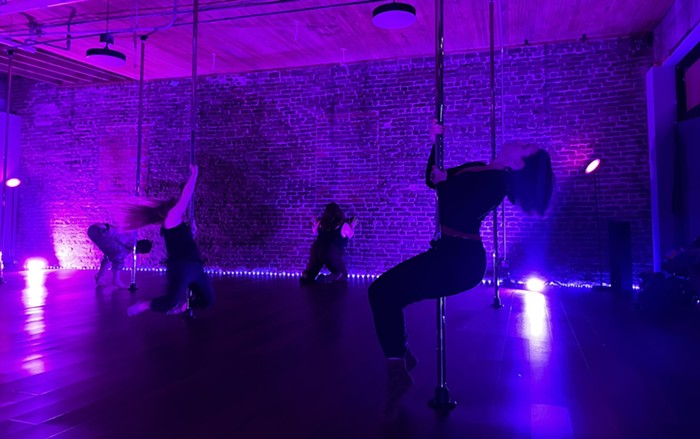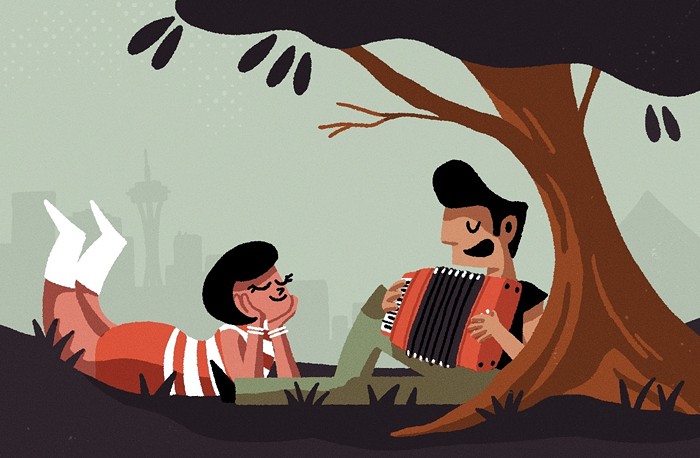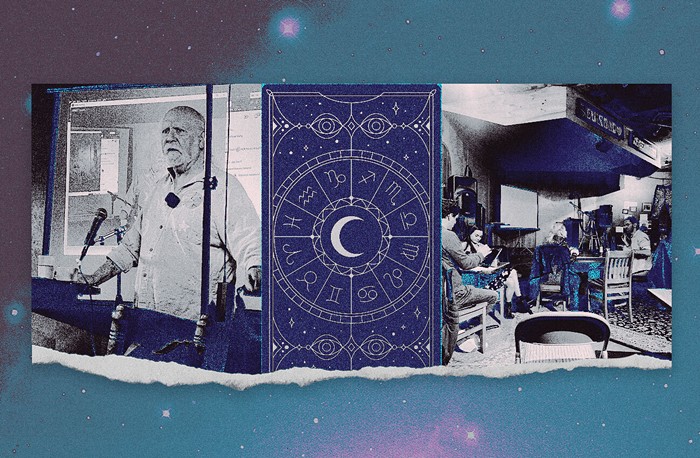I spent my first hour as a cat-human locked in a closet. I could hear swords clanging against shields and people shouting on the other side of the door. Finally, in a feat of dexterity, I picked the lock.
As a scout for the empire, I entered the fray. I shot my crossbow, caught an invisibility potion that I forgot to use, and then waited for an airship to whisk away me and my group before things went to shit. Well, before things really went to shit.
The rest of my party—who I was fairly confident were my allies, according to the lore document I’d speed-read that afternoon—lagged behind. Some of us made it onto the ship before the insurgency's base exploded. However, a paladin named Fayt and the warlock Wugat dangled from a rope beneath the ship. The barbarian, Emil, jumped down to help. Things weren't looking good as we started to take off.
“Looks like Fayt is about to become me,” said Jordan Houghton, the assistant director at the University of Washington’s Office of Student Veteran Life (OSVL). Houghton, who also plays Fayt, suffered a traumatic brain injury while serving as an Army combat medic.
For my most recent exploration into Seattle subcultures, I joined the OSVL for their weekly, three-hour Dungeons & Dragons session. I (metaphorically) donned the skin—well, pelt—of Raven Mist, a Tabaxi rogue. (In non-D&D terms, picture Indiana Jones with cat ears). I popped in during the 20th chapter of this story, a sprawling epic set in a fantasy world—y’know, like most D&D campaigns.
The rest of the adventurers, all of them military veterans in the real world, split up to raze a village of insurgents and recover a stolen star shard, a seemingly nuclear active element that grants its possessors magical abilities. Clearly, I’d picked a pretty tense moment to drop in on the goings-on around here.
Brandon Green, the Dungeon Master (DM) and a seven-year army combat medic veteran, wrote me into the story just for the night.
Every Thursday for months, the student veterans at UW log onto Zoom, DnDBeyond, Roll20, SoundScape, and Twitch to carry out Green's story, dubbed “Defenders of the Fallen Star." Two married Alaskan volunteer firefighters tune in to watch them live every week.
Green has constructed most of the OSVL’s campaigns since the group began playing D&D a little over three years ago. As Houghton puts it, the program “kinda took off.”
Thursday evenings spent as half-demon warlocks, vengeance-prone paladins, or wood merchant frog people are crucial for these former soldiers to rediscover their humanity.
A Stilted, Stuttering Re-entry
When you become a marine, an aviator, or a sailor, the military needs a minimum of six weeks to break down and strip away your civilian identities, said Dr. Sam Powers, the director of OSVL and a combat veteran of U.S. Air Force Special Operations.
The powers that be replace civilian identities with uniformity, rules, and intense structure.
“When we get out, there’s nothing,” Powers said. “It's basically like, ‘There’s the gate.’”
When she left the Air Force, Powers said she received a day-and-a-half of PowerPoint slides on how to get a job.
“[We] end up with a whole bunch of vets who have no idea how to be a civilian,” she said.
One of the players, Liv Fowler, an undergraduate at UW, left the Navy for mental health reasons after two years. Six months into her time in the Navy, her husband, an active-duty marine, died by suicide. A year-and-a-half later, Fowler “got out and immediately isolated myself,” she said.
Coming to UW was a positive change, but interacting with other students who were often younger than her and who had completely different life experiences felt impossible, Fowler said.
“All of that is exacerbated by being in the military, where you have this rigorous structure for how and when and with whom you communicate,” Fowler said.
She jokes she’s “socializing on hard mode.”
As a role-playing game, D&D can help with all of this: the learned rigor, the difficulty communicating, the trauma.
Rolling Toward Normalcy
D&D is a helpful bridge for people transitioning out of the military because “it’s a controlled environment, for the most part,” Houghton, a psychologist and certified therapeutic dungeon master, said.
There’s some structure in the rules, the mechanics, and the constraints of whatever world your DM, a sort of commander, creates. At the same time, a lot of it is improv. Players decide their reactions on-the-spot in combat sequences while collaborating with the characters on their team. It’s creative decision-making shaped by the whims of a 20-sided die.
According to Houghton, D&D helps break people out of living in a highly regimented, service-oriented mode and allows them to play with randomness and the unknown.
In the armed forces, not following a rule as small as being on time can have catastrophic impacts to a service members’ career, Houghton explained. Through D&D, players explore decisions and possible consequences. “You roll the dice to see ‘Am I going to show up? What are the consequences if I don’t? Oh, minus one health,’” Houghton said.
Learning to adapt to chance and not break down emotionally is a learned skill for some vets.
“Allowing yourself that ability of randomness is crucial for living a pretty happy life,” Houghton said.
D&D can also help process traumatic events, or even the loneliness of being a civilian again.
“All of us have self-inserted into a character to work through something difficult in our life,” Houghton said. “I definitely have a large bit of myself in all of my characters.”
In psychological terms, creating a character between the “flawed self and the ideal self” can help players. Who would you want to be if you could be anyone? What tendencies do you have that you want to work on? Strike a balance between the two with your character.
In the current campaign, Houghton plays Fayt, a paladin out for vengeance. Whenever he comes across a member of an insurgency group, Fayt "tries to murder them," he said. This puts the team in many pickles.
Fowler's character, a tiefling warlock named Petra Alaric, isn't a self-insert. Through the story's impacts on Petra, Fowler’s been working through her own feelings of grief and guilt.
“It’s my foray into using role-play as something more than entertainment,” she said.
The story itself even tends to mirror real life.
“While some of the scenarios are purely fantastical,” Green, the DM, explained, “many of the conflicts we address are born from my or my player's life experiences. We've addressed betrayal, moral conflict, sacrifice, loss, and questionable orders from superiors.”
Green built the current “Defenders of the Fallen Star” campaign “around a series of moral dilemmas and the associated choices.”
Defending the Fallen Star
Most of the D&D campaigns OSVL hosts aren’t based on military missions. This one definitely is.
Seven of the vets from OSVL play in this campaign. They each play characters from different military branches who formed a special operations team. Their goal, as I understand it, is to crush rebellions from insurgents in the wake of the emperor’s assassination.
“It’s pretty much Afghanistan but in medieval terms,” Houghton said.
Before playing, Green caught me up. I retained maybe 10% of what he said. At the time, the team was in the process of laying waste to a village, including women and children.
I’m not sure if the village-razing happened because of the plot or because of this one pacifist character, Stony Skiopalas, a druid with an Ella Enchanted-esque curse that makes him bend to anyone’s will. Someone told Stony to kill the whole village, so he did.
Either way, they’re killing people in the name of justice, Green said. That idea forms a key part of his plan as he steers the group toward committing more and more heinous acts. He has a twist coming that I will not spoil. He’s not sure how the players will react.
Whatever happens, the vets have each other. Often, when encountering tough subject matter in the game, Green pauses. Sometimes pseudo-group-therapy happens. One player told him the D&D sessions “were more therapeutic than counseling at the Veteran’s Affairs facility."
Dice at the Ready
We all met on Zoom. Headsets on, tabs open, snacks handy. The group caught up on everyone’s weeks, sharing life updates and gossiping before the game started.
As a filler character, I didn’t have a ton to do. I was fine with this. Green sent me two separate documents filled with heaps of information in addition to my own character sheet. I could barely keep up.
I was an scout for the empire who was caught in a skirmish and detained. Before my capture, however, I heard some tidbits that might have been interesting to the other adventurers. I, of course, forgot to share any of these tidbits. The game went on.
In-between their turns, combat raged on and players texted in the Zoom chat box. Houghton spent a recent flight creating sonnets for each of the characters. He shared those poems throughout the game.
After a break where Green brought out his flame-haired two-year-old daughter, Arya, to say hi to everyone, we made our escapes from the skirmish. Things turned grim. The star shard glowed brighter. Explosion seemed imminent. We rushed to an airship.
“Okay, everyone—roll for dexterity,” Green said. We rolled, clicking the requisite buttons on the online character sheets and triggering virtual dice.
“Anyone who rolled below an 11 doesn’t make it on the ship,” Green said.
Houghton and two other doomed players didn’t roll high enough. They joked about their luck, bemoaning the dice. Usually, in situations of near or certain death, players can make a saving throw, or one last bid for life. Not this time.
“The light from the star shard atomizes Fayt, Wugat, and Emil,” Green narrated. They died immediately.
On the Zoom call, everyone’s pixelated mouths fell open. The lute-heavy ambient sound Green piped through the stream accompanied stunned silence.
“Wait, before I die, can Fayt say something?” Houghton asked. A will-they-won’t-they romantic subplot between Fayt and the non-player character ship captain needed resolution.
Green nodded.
“I love you,” Houghton said as his character's official last words, “and I’m sorry.” Then, death. Green, acting as the captain, simulated the captain's pain.
Disbelief fell on the group like a shroud.
“I’m so fucking mad at you Brandon,” one player said to Green.
“Sorry,” Green said, “I’ve never killed anyone before.” In almost four years as a DM, these were the first major character deaths he’d dealt. “I feel weird killing people.”
“I feel weird dying,” Houghton said.
All the while, tears streamed down Fowler’s face.
The love story triggered “a hard flashback,” she said. Around three years ago when her husband died, she’d been in the same position as the fictional airship captain.
“Brandon,” Fowler laughed through her tears, “I know you’ve never been abruptly widowed, but your portrayal was spot on.”
The group swathed her in supportive words, invitations to talk, and soft condolences.
“Oh no,” Green said, looking aghast, “I broke my friend.”
Fowler shook her head.
“This was a potential consequence in the campaign,” she said. “You didn’t break me. I was already broken.”
Solemnly, each player read the sonnet Houghton wrote for their character as if they were goodbyes written by a prescient Fayt.
In future games, Houghton will make another character, as will the other players whose characters died. Luckily, unlike life, the game goes on past one character's game-over.
Any ideas on which Seattle subculture I should explore next? Want me to tag along with you on your favorite hobby or pastime? Send me tips at playdate@thestranger.com.




















